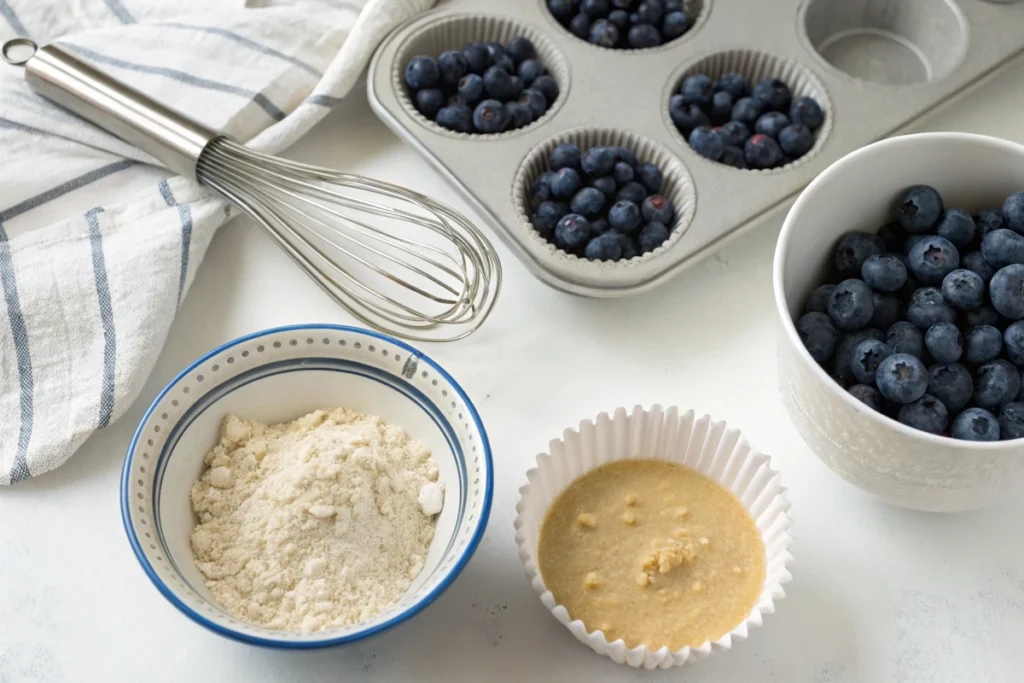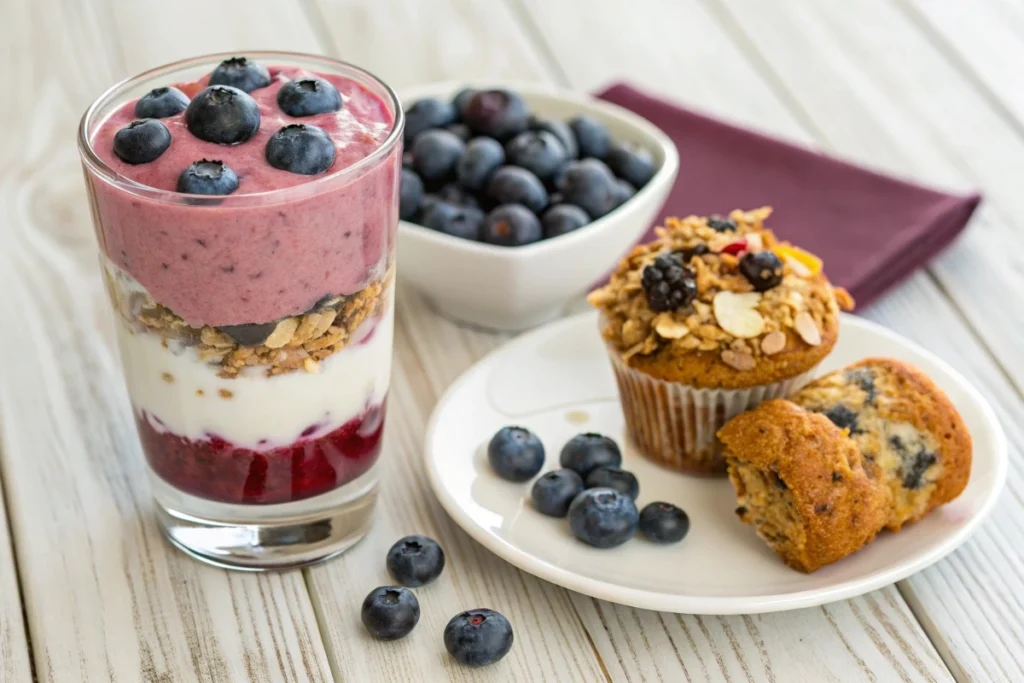Blueberry muffins—soft, fluffy, and loaded with bursts of juicy fruit—are a beloved treat. But the question many health-conscious individuals often ask is: Are blueberry muffins healthy? While they might seem like a wholesome snack, the reality depends on their ingredients and preparation. This article explores their nutritional value, the risks of consuming commercially made muffins, tips for making healthier versions at home, and alternative blueberry-based breakfast options. Let’s uncover whether blueberry muffins deserve a place in your balanced diet.
Table of contents
Nutritional Profile of Blueberries and Muffins
Blueberries are often hailed as a superfood, packed with antioxidants, vitamins, and minerals. But what happens when they’re mixed into muffins? Let’s take a closer look at the benefits of blueberries and the ingredients typically found in muffins.
What Makes Blueberries a Superfood?
Blueberries are nutritional powerhouses. These tiny berries are rich in antioxidants, particularly anthocyanins, which give them their vibrant blue color and support heart health. They also provide essential nutrients like vitamin C, vitamin K, and potassium, all of which contribute to a strong immune system, healthy bones, and regulated blood pressure.
What’s more, blueberries are low in calories and high in fiber, which aids digestion and helps you feel full longer. Incorporating fresh or frozen blueberries into your diet is an excellent way to boost overall health. Whether in smoothies, yogurt, or baked goods, they bring more than just a pop of flavor.
Ingredients in a Typical Blueberry Muffin
Unfortunately, the health benefits of blueberries can be overshadowed by the other ingredients in most muffins. Store-bought blueberry muffins often rely on refined flour, sugar, and unhealthy fats to create their moist texture and sweet flavor. Here’s a breakdown of what’s typically inside:
- Refined Flour: This processed ingredient strips away fiber and nutrients, offering empty calories instead of long-lasting energy.
- Added Sugars: Many muffins contain upwards of 20 grams of sugar, which can lead to energy crashes and increase the risk of chronic conditions like diabetes.
- Unhealthy Fats: Commercial muffins often include hydrogenated oils or trans fats to extend shelf life, which are harmful to heart health.
In contrast, homemade blueberry muffins can be tailored to include healthier ingredients, such as whole grains, natural sweeteners, and heart-healthy fats. The difference in nutritional value is significant, making homemade options a better choice for mindful eaters.
Health Risks of Commercial Blueberry Muffins
While blueberry muffins can seem like a healthy choice, most commercially prepared versions have nutritional downsides. Understanding these risks can help you make smarter choices when reaching for this popular treat.
High Sugar and Caloric Content
Commercially produced blueberry muffins are often loaded with added sugars and calories. Did you know some bakery muffins pack over 20 grams of sugar per serving? That’s close to the daily limit recommended by health experts. Excess sugar not only causes blood sugar spikes and crashes but also contributes to long-term risks like diabetes and weight gain.
Additionally, many of these muffins are calorie-dense, sometimes exceeding 400 calories each—more than a light meal! Regular consumption of such high-calorie snacks can disrupt weight management efforts and impact heart health.
Additives and Unhealthy Fats in Packaged Muffins
Beyond sugar and calories, store-bought muffins often contain harmful ingredients to enhance flavor and shelf life. Additives like artificial flavors, preservatives, and coloring agents provide no nutritional value and may even harm your body in the long run.
What’s worse, many commercial muffins include unhealthy fats like trans fats or partially hydrogenated oils. These fats are linked to increased cholesterol levels and a higher risk of cardiovascular diseases. Swapping packaged muffins for homemade versions allows you to avoid these hidden hazards and focus on nutrient-rich ingredients.
How to Make Healthier Blueberry Muffins at Home
Homemade muffins offer the perfect opportunity to enjoy this classic snack without compromising your health. By selecting high-quality ingredients, you can bake muffins that are both delicious and nutritious.
Healthier Ingredient Substitutions
Creating a healthier version of blueberry muffins starts with smarter ingredient choices. Swap refined flour for whole wheat flour to increase fiber content and add a nutty flavor. Almond flour is another great option, providing healthy fats and added protein.
Instead of sugar, opt for natural sweeteners like honey or maple syrup to achieve a milder, more wholesome sweetness. Coconut oil or Greek yogurt can replace butter, offering similar moisture without the unhealthy fats.
Simple Homemade Blueberry Muffin Recipe
Here’s a quick recipe to try at home:

- Preheat your oven to 375°F and line a muffin tin with paper liners.
- In a bowl, mix 1 cup of whole wheat flour, 1/4 cup of almond flour, 2 teaspoons of baking powder, and a pinch of salt.
- In another bowl, whisk together 1/3 cup of honey, 1/2 cup of milk, 1 egg, and 1/4 cup of melted coconut oil.
- Combine wet and dry ingredients, then fold in 1 cup of fresh blueberries.
- Spoon the batter into the muffin tin and bake for 20-25 minutes.
These muffins are a flavorful and nutrient-dense alternative to store-bought options, and they answer the question, Are blueberry muffins healthy?, with a resounding yes—when made right!
Choosing Healthier Options at Bakeries
When indulging in a bakery blueberry muffin, making mindful choices can help you enjoy your treat without overloading on sugar and calories. Let’s explore how to identify the healthiest options.
Identifying Muffins with Whole Grains
One of the easiest ways to spot a healthier muffin is to check for whole grains as the main ingredient. Whole grain flour is packed with fiber, vitamins, and minerals that refined flour lacks. Many bakeries now label their muffins to highlight these healthier options.
Whole grain muffins are not only more filling, but they also help regulate blood sugar levels. Paired with the antioxidant power of blueberries, these muffins can be a smarter choice when eating out.
Opting for Smaller Portion Sizes
Another factor to consider is portion size. Bakery muffins are often oversized, with some containing over 500 calories! Whenever possible, choose a smaller muffin or ask if the bakery offers mini versions. These smaller portions can satisfy your cravings without derailing your dietary goals.
Alternatively, you can split a larger muffin with a friend or save half for later. By practicing portion control, you can enjoy your favorite treat while maintaining a balanced diet.
For more nutritious breakfast ideas, consider checking out the “Lavender Jungle Oats” recipe on iamarecipes.com. It’s a healthy and flavorful way to start your day!
Incorporating Blueberry Muffins into a Balanced Diet
Blueberry muffins can fit into a healthy lifestyle if consumed mindfully and paired with other nutrient-dense foods. Here’s how to enjoy them without compromising your health.
Portion Control and Frequency
The key to incorporating blueberry muffins into a balanced diet is moderation. Instead of having muffins daily, reserve them as an occasional treat. Pairing a small muffin with nutrient-dense sides can create a more balanced meal.
For instance, enjoy a muffin with a handful of nuts, a boiled egg, or a serving of plain Greek yogurt. These additions provide protein and healthy fats, helping to stabilize blood sugar levels and keep you feeling full longer.
Pairing Muffins with Nutrient-Dense Foods
Blueberry muffins work best as part of a meal that includes fruits, vegetables, or protein-rich foods. For example:
- Add a side of fresh fruit for extra fiber and vitamins.
- Pair the muffin with a smoothie that includes leafy greens and a scoop of protein powder.
By combining a muffin with nutrient-rich options, you can balance its sugar and calorie content, making it a more satisfying and healthier choice.
Alternative Blueberry-Based Breakfast Options for Better Health

If you love blueberries but want healthier breakfast choices, there are plenty of alternatives to blueberry muffins. These options retain the sweet, tangy flavor of blueberries while offering more balanced nutrition.
Blueberry Smoothies for a Quick, Healthy Start
Blueberry smoothies are a fast and healthy alternative to muffins. They pack the same antioxidant benefits of blueberries without the added sugar and fats found in many muffins. Combine a handful of fresh or frozen blueberries with almond milk, Greek yogurt, and a scoop of protein powder for a filling, nutrient-rich drink.
You can also boost your smoothie with spinach or kale. These leafy greens blend well with blueberries and provide an extra dose of vitamins and fiber. Smoothies are perfect for busy mornings when you need a quick, portable meal.
Blueberry Yogurt Parfaits
Parfaits are another delicious and nutritious way to enjoy blueberries for breakfast. Start with a base of Greek yogurt, which is high in protein and probiotics. Layer it with fresh blueberries, granola, and a drizzle of honey for natural sweetness.
The combination of protein, healthy fats, and fiber in parfaits makes them a balanced and satisfying choice. Plus, they’re easy to customize with nuts, seeds, or other fruits for variety. If you’ve ever wondered, Are blueberry muffins healthy?, parfaits offer a smarter alternative without sacrificing flavor.
FAQs About Blueberry Muffins
Curious about the health aspects of blueberry muffins? Here are answers to some common questions that can help you make informed choices.
Are Blueberry Muffins Healthy for Weight Loss?
Blueberry muffins can be part of a weight loss plan if consumed in moderation and made with healthy ingredients. Opt for smaller portions and recipes that use whole grains and natural sweeteners. Pairing a muffin with protein-rich sides can also help curb hunger.
What Makes Homemade Muffins Healthier?
Homemade muffins are healthier because you control the ingredients. By using whole wheat flour, reducing sugar, and adding healthy fats like coconut oil, you can significantly improve their nutritional value.
Can I Substitute Blueberries with Other Fruits?
Absolutely! While blueberries are packed with antioxidants, other fruits like raspberries, strawberries, or diced apples work well in muffins too. Just be mindful of any added sugars in the fruit.
How Many Calories Are in a Typical Muffin?
The calorie content varies, but many store-bought muffins contain 350-500 calories. Homemade muffins can be lower in calories if made with lighter ingredients.
Are Gluten-Free Blueberry Muffins Healthier?
Gluten-free muffins can be a better choice for people with gluten sensitivities or celiac disease. However, they’re not automatically healthier unless made with nutrient-dense flours like almond or oat flour.
Balancing Blueberry Muffins as Part of a Healthy Diet
Blueberry muffins can be part of a balanced diet if consumed thoughtfully. It’s all about making mindful choices to enjoy your favorite treats while maintaining your health goals.
Incorporating Muffins into a Balanced Meal
To make a blueberry muffin part of a balanced meal, pair it with foods that provide protein and healthy fats. For example, enjoy a small muffin alongside scrambled eggs or a dollop of Greek yogurt. These additions help stabilize blood sugar and keep you full longer.
Adding a side of fresh fruit, such as sliced apples or oranges, can boost your meal’s vitamin and fiber content. By combining these nutrient-rich foods, you can enjoy a muffin while keeping your overall meal balanced.
Watching Portion Sizes
Portion control is key when it comes to muffins. Large muffins can pack over 400 calories, so choosing smaller portions is a smart move. If smaller sizes aren’t available, consider splitting a muffin with someone or saving half for later.
This approach allows you to indulge in your favorite baked goods without overdoing it. By asking, Are blueberry muffins healthy?, you’re already taking a step toward eating more mindfully.
Final Thoughts – Are Blueberry Muffins Healthy?
When enjoyed in moderation and made with wholesome ingredients, blueberry muffins can be a delightful part of a healthy lifestyle. Let’s recap the key takeaways.
Homemade Options Are Always Better
Homemade blueberry muffins are the clear winner when it comes to nutrition. Using whole grains, natural sweeteners, and healthy fats makes all the difference. Plus, you can control portion sizes and avoid additives often found in store-bought varieties.
Moderation Is Key
It’s important to remember that blueberry muffins, even the healthiest ones, are still a treat. Consuming them occasionally, rather than daily, helps ensure they don’t derail your diet. When paired with nutrient-dense foods, muffins can satisfy cravings without compromising health.
By exploring Are blueberry muffins healthy?, we see they can fit into a balanced diet when made with care. Whether you bake at home or choose wisely at the bakery, you can enjoy these treats without guilt. It’s all about balance, moderation, and smart choices.

